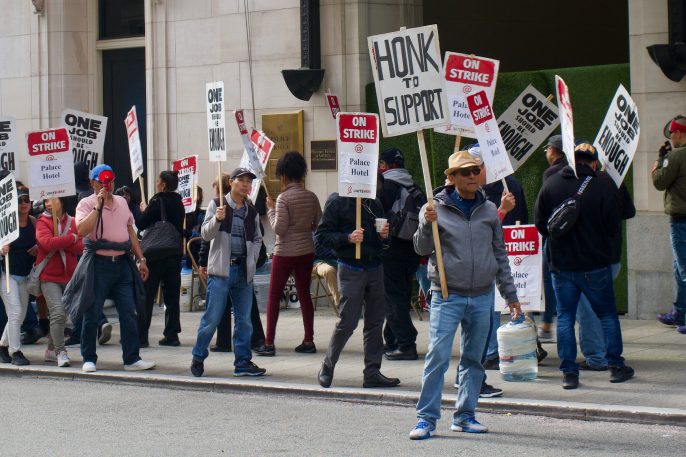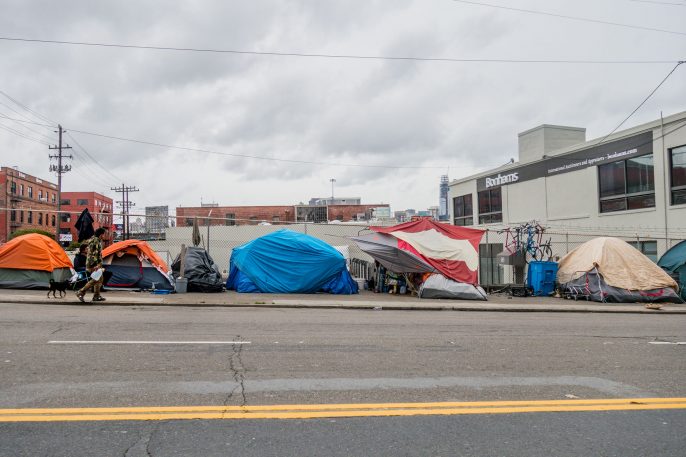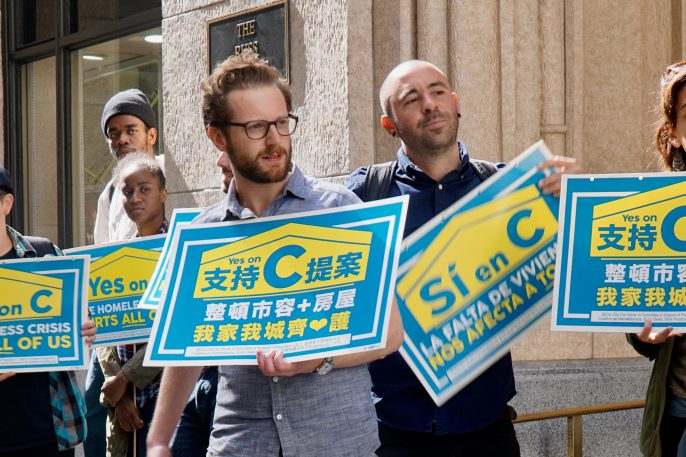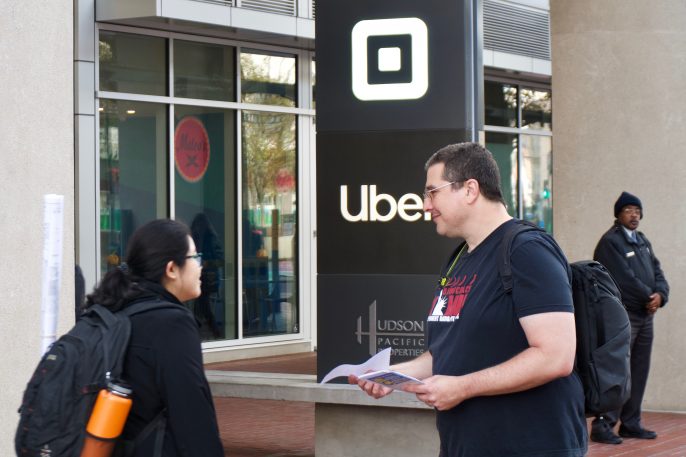All politics is local, goes the saying. But in technology hub San Francisco, local politics have sparked national debate among the billionaire leaders of global business empires.
The issue is a November ballot initiative, called Proposition C, that would raise between $250 and $300 million per year to fund homeless and housing assistance programs in the rapidly gentrifying city–roughly doubling what the city currently spends. San Francisco has thousands of homeless residents, and prohibitively high rents and home prices that make it hard for them to find (and stay in) housing. So activists are going to the city’s wealthiest companies to help solve the problem, proposing a tax averaging 0.5% on gross receipts of over $50 million per year.
Those companies that would be affected, though, include some of the biggest personalities in technology: The grandiose co-CEO of Salesforce, Marc Benioff, and confoundingly circumspect CEO of both Twitter and Square, Jack Dorsey. When Benioff came out in favor of Prop C and Dorsey stood up to oppose it, a local politics dispute over taxes became a celebrity death match that goes well beyond one local proposition and into a much broader conversation about the role these successful companies–and billionaire CEOs–have to play in how our country is governed.
“Proposition C is a referendum on the role of business in our communities and, by extension, our country,” wrote Benioff, with characteristic bravura, in a New York Times op-ed. And he put a lot of money behind his words.
Benioff (net worth $4.9 billion, according to Forbes) has so far donated $2 million to the Yes on C campaign, while Salesforce itself has put up another $5.05 million to defend it against lesser donations from opponents including Dorsey (net worth $3.1 billion) and Stripe CEO Patrick Collison (net worth $1 billion).
The companies, personalities, communities, and social crises wrapped into Proposition C guaranteed that it would grow from a local squabble to a referendum on the soul of big tech, and even the nation.
Here are three reasons why.
The Bay Area symbolizes everything that’s wrong with modern capitalism
The U.S. economy is booming–with both GDP growth and the official unemployment rate between 3% and 4%. But many Americans are struggling, working multiple low-wage jobs to continue living in, or even near, ever-pricier cities. The backbeat to the Prop C struggle has been the weeks-long chanting and drumming of thousands of striking Marriott hotel workers across San Francisco and other cities, carrying signs that read, “One Job Should Be Enough.”

Related: Across Silicon Valley, cities may tax big tech to help struggling renters
At the same time, the city’s last biennial homeless survey, from 2017, puts the count at 7,499–by manually tallying up people in shelters and on the streets on a given night. But advocates reckon the total could be more than double that, based on the number of people using city services for the homeless.
Whatever the exact number of homeless, it doesn’t seem to have budged much in recent years. Opponents of Prop C, noting that the homeless count hasn’t gone down, say that policies have failed, and that more money shouldn’t be thrown at the problem. Proponents, noting that the number hasn’t gone up, despite a growing income gap, counter that policies have been working and just need more funding. Homeless services have gotten many people off the street, but newly homeless people have taken their place.
Regardless whether funding, oversight, or both are insufficient, the level of care certainly is. Shelters are short about 1,000 beds every night. And daily encounters with homeless encampments, street drug use, and sometimes threatening homeless residents make clear to all San Franciscans that mental healthcare is not keeping up.
Nor can it without first getting people housed, says Samantha Lew of the Coalition on Homelessness, who’s serving as manager for the Prop C campaign. “Think about not having [healthy] sleep for weeks on end, also not having a roof over your head, being exposed to violence, whether that’s verbal, physical, sexual violence, particularly for women,” she says. “Even if you didn’t have a mental health condition before, you are under so much stress and trauma that you will almost surely develop one.”

Over half of Prop C’s revenue goes to preventing homelessness–funding affordable housing construction and maintenance or rent subsidies, for instance. That resonates in one of the country’s most-expensive cities, where just a studio apartment averages nearly $2,500 per month.
Prop C paints as the villains companies and CEOs people already dislike
The most visible opponent is Twitter CEO and cofounder Jack Dorsey, who has donated $125,000 to the No on Prop C campaign. Contempt for Twitter unites Americans. Nationally, liberals condemn the flowering of racist, chauvinist, and disruptive foreign-troll accounts. Conservatives, up to President Trump, condemn what they call a bias against right-wing voices and opinions.
Twitter “SHADOW BANNING” prominent Republicans. Not good. We will look into this discriminatory and illegal practice at once! Many complaints.
— Donald J. Trump (@realDonaldTrump) July 26, 2018
Locally, San Franciscans grumble about the multiyear payroll tax holiday that the city granted Twitter (and others) to locate its headquarters in the Mid-Market Street neighborhood. It created high-paid jobs that fuel gentrification, without doing much for local businesses–including the new restaurants and markets that opened up in the hopes of a neighborhood renewal. Tech employees stick to their companies’ cafeterias for lunch (which some local politicians have flirted with banning) or hightail it out of the neighborhood after work for the hipper parts of town.
Dorsey is less worried about the tax hit to Twitter than to his other company, Square. Because it would be taxed on total income, which mostly goes straight to Visa, MasterCard, and other payment services that Square acts as a conduit for, Dorsey reckons this would require Square to pay twice as much per year (about $20 million) as Benioff’s much-larger Salesforce.
But the details of tax assessment don’t grab headlines. Resistance by a billionaire recipient of taxpayer largesse to tossing a few million dollars at a desperate situation does–especially after all U.S. corporations just got a massive tax cut. The ongoing smackdown with Benioff on–what else, Twitter–also makes great entertainment.
Hi Jack. Thanks for the feedback. Which homeless programs in our city are you supporting? Can you tell me what Twitter and Square & you are in for & at what financial levels? How much have you given to heading home our $37M initiative to get every homeless child off the streets?
— Marc Benioff (@Benioff) October 12, 2018
Marc: you’re distracting. This is about me supporting Mayor @LondonBreed for *the* reason she was elected. The Mayor doesn’t support Prop C, and we should listen to her. I support the Mayor, and I'm committed to helping her execute her plan.
— jack (@jack) October 12, 2018
If you're going to fight a relatively small tax, which is one half of one percent to help our number 1 issue, then you better prepared to talk about what you are doing versus what you don't want to do. @OurHomeSF Vote Yes Prop C for The Homeless. https://t.co/hlO2vr5JID
— Marc Benioff (@Benioff) October 12, 2018
Fewer people are likely to have a negative opinion–or any opinion–about Salesforce as about Twitter. A maker of cloud-based customer relationship management software hardly compares to the social network where Beyoncé drops new songs and Kanye goes to crazy town. And Benioff projects an image of himself as a philanthropist (giving mightily to local charities) and of Salesforce as the corporate citizen of San Francisco–what Kodak once was to Rochester. The extra $10 million in taxes that Prop C will cost is a small sum toward these goals.
Dorsey deserves credit for honestly explaining his financial objections. Neighboring payments company Stripe, on the other hand, which has donated $420,000 to the No campaign, basically says: leave the problem to the mayor–who happens to oppose Prop C. No on C donations have also flowed from other financial firms, such as Visa, which has given $225,000. (Other big donations include $150,000 from Y Combinator cofounder Paul Graham, $100,000 from Michael Moritz of Sequoia Capital, and 100,000 from Charles Schwab, founder of the eponymous corporation.)
Lyft, which has donated $100,000, objects for similar reasons as Square and Stripe–since it’s a low-margin business. Lyft may be seen as the less-evil alternative to Uber, but gig-economy vendors–critiqued for offering low wages and no benefits to the very struggling Americans getting hammered by the income gap–don’t enjoy much sympathy, either.
The culture was primed for a fight with big tech
Rampant privacy breaches, social media election manipulation, controversial projects for both the U.S. and Chinese governments, and a growing litany of sexual assault and discrimination claims. Silicon Valley is at the nadir of public opinion–on both the left and the right.
In recent years, especially since 2016, an infrastructure of opposition to big tech has emerged. It’s often lead from within, by disgruntled employees organizing in groups such as the Tech Workers Coalition, the TechEquity Collaborative, and the Democratic Socialists of America (DSA).
In the past year, for instance, Google employee protests shut down the company’s contract with the Pentagon’s artificial intelligence initiative, Project Maven, and derailed its ambitions to pursue a potential $10 billion contact for a Pentagon cloud-computing project called JEDI. They also helped expose the harassment, including sexual harassment, of minority and female employees going back years.
Employees from Microsoft, as well as Salesforce, have protested their companies’ involvement with the U.S. military and Homeland Security. Some of the same tech worker activists that allied with Marc Benioff on Prop C oppose him on the company’s contract with U.S. Customs and Border Protection.

Related: How tech workers became activists, leading a resistance movement that is shaking up Silicon Valley
Workers from Dropbox, Facebook, Google, Hustle, Stripe, and other companies–some veterans of past tech worker protests–have donated tens of thousands of dollars to the Yes on C campaign. The bulk of it came from LinkedIn engineer Evan Owski, who’s been working on homelessness issues for a year and a half through a local DSA working group. At a small tech worker rally for Prop C in early October, Owski drew a line through all the protest issues.

Increasingly unpopular with the public and challenged by activists inside and out, tech companies are under an ethical microscope. Any one issue is judged in context of all the others. And every battle becomes an existential one.
Correction: An earlier version of this article erroneously attributed a donation to the Charles Schwab Corporation, rather than to the individual named Charles Schwab.
